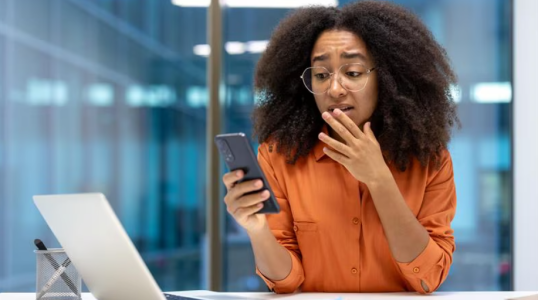What is the etiquette around calling someone out of the blue?
By
ABC News
- Replies 0
Does your stomach drop when your phone rings unexpectedly?
Modern communication is always changing, and while it might have been normal for our parents to just pick up the phone to call someone, these days it can feel stressful or strange for both the caller and the receiver.
We asked two communications experts for their take on calling someone out of the blue.
Calls can be like 'dropping in unannounced'
If you ask Anna Musson, an etiquette expert from Tarndanya lands/Adelaide, calling someone out of the blue is the modern-day equivalent of dropping in on someone unannounced.
"But context is key," she adds.
"If it's grandma and she loves it, that's fantastic."
But "If it's a teenager or a friend of yours who you know does not like to receive calls," that's a different thing.
Dr Naomi Smith, a digital sociologist at the University of the Sunshine Coast/Kabi Kabi land, says she is often struck by "horror" when her phone rings unexpectedly.
"It feels very pressing, the demand of a phone call," she says.
"You have to deal with it right then and there and give it your attention in the moment, in the same way you would if someone popped over unannounced."
"We like a bit of a heads up before someone calls so we can prepare ourselves mentally for the phone call that's going to take place."
Do I have telephobia?
Our experts say a rise of scam calls, anxiety around communication and a preference for written communication, is giving rise to a phenomenon known as "telephobia".
Telephobia is the fear of or reluctance to make or take phone calls. It's considered a type of social phobia or social anxiety.
"I think there's a sense of risk around answering a phone call now," Dr Smith says.
"We all know that numbers can be spoofed and every time someone calls me up, out of the blue, it seems to be someone wanting something from me or trying to scam me."
Ms Musson says younger generations are typically more likely to experience telephobia.
"We're talking about Gen Zs and below, even a lot of millennials, they really prefer being able to control the method by which we're speaking to them, and they prefer text.
"They would even prefer a video chat over a phone call because it's just the way that they were raised."
When to call and when to text
Ms Musson says we all need to have the ability to speak over the phone, both in our personal and professional lives.
"It is actually a life skill, and there are instances when a phone call is appropriate," she says.
"For example, if someone has passed away, think about what is going to be the most appropriate way to connect and show that you care?
"And if it is someone who you know would rather a text, that's fine, but in many instances a phone call is appropriate if you're checking if someone is doing ok.

"Or let's say you need to call the bank to verify your identity.
"Remembering the person on the other end of the line wants to get a good solution too, so put a smile on your voice, make sure that you're clear with your communication."
Dr Smith says a quick text prior is thoughtful, depending on who you're wanting to call.
"I wouldn't text my mum and say, 'hey, I'm going to call you now', I think she would find that very strange," she says.
"But some of my friends who I know are a bit phone shy, I would text them and say, 'hey, I want to have a quick chat, it's nothing serious, I just want to hear your voice'.
"So they're just like, 'oh, she's just calling to say hi and hear the latest' and it's going to be a light, easy conversation."
Human contact is 'crucial'
Ms Musson says these personal interactions are important for everyday life.
"These human contacts are crucial, and we've got to look after each other's our own and each other's mental health," she says.
"So don't shrink back, don't hold back from picking up the phone and making those phone calls.
"If that means a text prior then definitely do it."
Written by Amy Sheehan, ABC News.
Modern communication is always changing, and while it might have been normal for our parents to just pick up the phone to call someone, these days it can feel stressful or strange for both the caller and the receiver.
We asked two communications experts for their take on calling someone out of the blue.
Calls can be like 'dropping in unannounced'
If you ask Anna Musson, an etiquette expert from Tarndanya lands/Adelaide, calling someone out of the blue is the modern-day equivalent of dropping in on someone unannounced.
"But context is key," she adds.
"If it's grandma and she loves it, that's fantastic."
But "If it's a teenager or a friend of yours who you know does not like to receive calls," that's a different thing.
Dr Naomi Smith, a digital sociologist at the University of the Sunshine Coast/Kabi Kabi land, says she is often struck by "horror" when her phone rings unexpectedly.
"It feels very pressing, the demand of a phone call," she says.
"You have to deal with it right then and there and give it your attention in the moment, in the same way you would if someone popped over unannounced."
She says most people increasingly "like to have communication on their own terms and in their own time"."We like a bit of a heads up before someone calls so we can prepare ourselves mentally for the phone call that's going to take place."
Do I have telephobia?
Our experts say a rise of scam calls, anxiety around communication and a preference for written communication, is giving rise to a phenomenon known as "telephobia".
Telephobia is the fear of or reluctance to make or take phone calls. It's considered a type of social phobia or social anxiety.
"I think there's a sense of risk around answering a phone call now," Dr Smith says.
"We all know that numbers can be spoofed and every time someone calls me up, out of the blue, it seems to be someone wanting something from me or trying to scam me."
Ms Musson says younger generations are typically more likely to experience telephobia.
"We're talking about Gen Zs and below, even a lot of millennials, they really prefer being able to control the method by which we're speaking to them, and they prefer text.
"They would even prefer a video chat over a phone call because it's just the way that they were raised."
When to call and when to text
Ms Musson says we all need to have the ability to speak over the phone, both in our personal and professional lives.
"It is actually a life skill, and there are instances when a phone call is appropriate," she says.
"For example, if someone has passed away, think about what is going to be the most appropriate way to connect and show that you care?
"And if it is someone who you know would rather a text, that's fine, but in many instances a phone call is appropriate if you're checking if someone is doing ok.

Dr Naomi Smith is a digital sociologist at the University of the Sunshine Coast. (Supplied: Dr Naomi Smith)
"Remembering the person on the other end of the line wants to get a good solution too, so put a smile on your voice, make sure that you're clear with your communication."
Dr Smith says a quick text prior is thoughtful, depending on who you're wanting to call.
"I wouldn't text my mum and say, 'hey, I'm going to call you now', I think she would find that very strange," she says.
"But some of my friends who I know are a bit phone shy, I would text them and say, 'hey, I want to have a quick chat, it's nothing serious, I just want to hear your voice'.
"So they're just like, 'oh, she's just calling to say hi and hear the latest' and it's going to be a light, easy conversation."
Ms Musson says these personal interactions are important for everyday life.
"These human contacts are crucial, and we've got to look after each other's our own and each other's mental health," she says.
"So don't shrink back, don't hold back from picking up the phone and making those phone calls.
"If that means a text prior then definitely do it."
Written by Amy Sheehan, ABC News.









